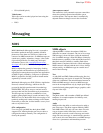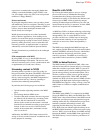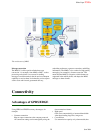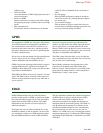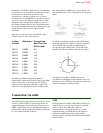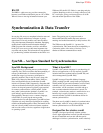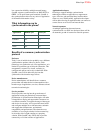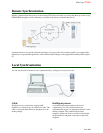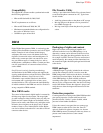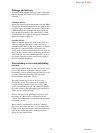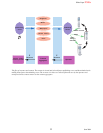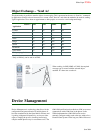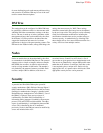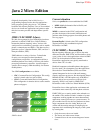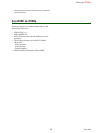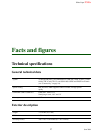
White Paper
Z500a
20 June 2004
Compatibility
The supplied PC software enables synchronization with
the following application:
• Microsoft® Outlook® 98, 2000, 2002
The PC requirements are as follows:
• Microsoft® Windows® 2000, Me, XP
• Minimum recommended hardware configuration for
the version of Windows in use.
• 30 MB free space on hard disk
File Transfer Utility
A utility is provided which enables files to be transferred
to and from the phone connected to a PC. Typical uses
for this include:
• Archiving pictures taken on the phone to PC storage
• Moving images to the phone to use in personaliza-
tion, MMS messages etc.
• Moving sound clips to/from the phone for personali-
sation.
DRM
Digital Rights Management, DRM, is a technology that
enables secure distribution, promotion, and sale of digital
media. Examples of such content include images,
wallpapers and screen savers with themes from films,
ringtones from musical artists, and branded games. In
other words, content providers can control how users
may use different types of content in devices, such as
mobile phones, smartphones or PDAs. Content providers
can also control the use of content in related services,
such as MMS.
Sony Ericsson is actively focusing on technology
standardization for the DRM concept, and supports the
ongoing standardization work and activities of the OMA
(Open Mobile Alliance). Sony Ericsson is fully
committed to open standard solutions in the mobile
environment and is a principal driver of many open
standard initiatives. This will ensure the interoperability
of mobile terminals in the DRM area and also result in a
strong, competitive DRM standard.
How DRM works
The control of the content in digital media is executed by
defining usage rights for the content. The usage rights
give the content providers flexibility in the way they can
publish and sell content. Rights can be defined so that a
picture can be used by subscribers only, and rights can be
defined so that a ringtone can be played only a limited
number of times or for a limited period of time. Rights
can also be defined so that the user is not able to forward
content to other devices.
Packaging of rights and content
Rights and content can be packaged together and
delivered to the device as one DRM package. As an
alternative, content can be delivered to the device first,
followed by the rights later being pushed to the device,
for example via SMS. The kind of service and business
model adopted by the content provider determines how
the content and rights should be packaged and delivered
to the device.
DRM packager
A DRM packager is typically included in the software
used by the content provider. It is used to create the
DRM package that is delivered to the device, including
content and associated rights. In the device, the content
of the DRM package is made available to the user
according to the rights. For example, if the rights permit
the user to play a ringtone ten times, the device will keep
track of the number of times the ringtone is played, and
notify the user when the ringtone has been used for the
tenth time.
Protection properties
Content protection according to the OMA DRM standard
gets special properties. Content with forward lock
protection has the “Send to” option disabled, which
prevents it from further distribution.
Unless the content is encrypted, the user cannot copy
DRM content to other devices since the “Send To”
option is disabled for pictures, ringtones, etc. that are
OMA DRM protected. Content providers may choose to
protect some content, but leave some content
unprotected.



